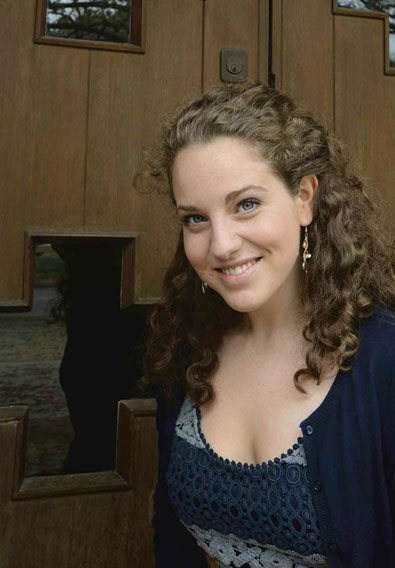A recipient of the Udall Scholarship and a Rhodes and Marshall finalist, Lena Connor ’13 is a double major in environmental analysis and politics, with a minor in religious studies. Connor was among the first group of students awarded fellowships for full-time summer internships, funded by gifts to the Daring Minds campaign. She spent last summer working as a theological researcher for the National Council of Churches, where she put together the first comprehensive database of Protestant ecotheologians in the U.S. Connor, who grew up in Florida and Iowa, is commissioner of environmental affairs for Student Senate, a leader of the Pomona Student Union and a member of Uprising Christian Fellowship and the Pomona College Choir
 Shifting focus
Shifting focus
When I first came to Pomona, I was interested in the policy side of the environmental movement. But after I started classes, I shifted my focus. Coming from a very conservative part of the U.S., I saw that a lot of political impasses have deeper roots in people’s cultural and religious ways of viewing resources, and in the way we organize societies and make economic decisions. I became more interested in getting to the roots of some of those problems after taking a class from Professor Char Miller and reading authors like Wendell Berry.
Finding inspiration
The summer after my sophomore year, I got a Mellon grant to study bauxite mining in Brazil. When I got there, I realized that the most important actors in mediating conflict and advocating for the rural farmers were the Franciscan priests. I had been disenchanted with Christianity’s ability to do much about the environment in the U.S., partly because of apathy and because the issue had been so politicized. Being in Brazil refreshed my spirit and inspired me, because I’d seen a group of Christians who could incorporate ecological and Christian ethics and have their parishioners accept and embrace it.
From the rainforest to Oxford University
I designed a one-on-one tutorial at Oxford with an emphasis on environmental ethics and spent hours and hours in libraries reading through theological texts. It was one of most emotionally and intellectually fulfilling experiences of my college career, and I decided then I wanted to study the intersection of religion and environmentalism for the rest of my life. The people who suffer from environmental degradation are often the poorest, and there is a link in Christian theology between renewal of the earth and caring for the marginalized.
Transforming practical experience into a senior thesis
My internship with the National Council of Churches gave me a more nuanced and informed look at how academic theology and nonprofits interrelate, and how you get ecotheological theory from the ivory tower to the pulpit and into the political realm of discourse. I also attended a conference in Pennsylvania, where a Lutheran synod created a task force to study the controversial gas extraction method known as “fracking” and passed a resolution for a moratorium against it. I interviewed the congregants and pastors about the church’s appropriate role, which along with my experience in Brazil, became part of my senior thesis.
What is really valuable
Pomona, more than anything else, has taught me that this track that we’re on is not just a superficial endeavor about wealth or success or worldly glory. In my time here, I’ve been instructed by people who are grounded in what is really valuable in life. When I leave and go to graduate school and enter into what I would like to do, which is becoming ordained and doing academic ecotheology, I want to carry on what Pomona has given me by focusing on something in a deep and meaningful way.
